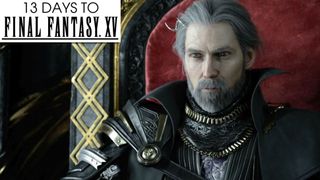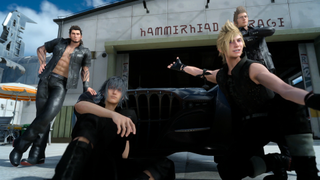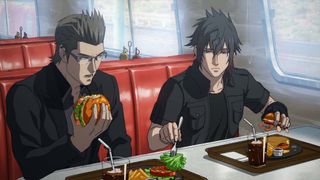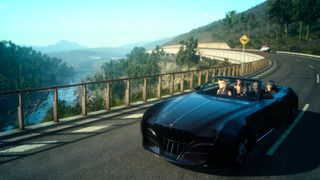The Kingsglaive movie gives me hope for Final Fantasy 15

Kingsglaive, the feature-length Final Fantasy 15 tie-in prequel starring Aaron "Yeah science!" Paul, isn't just a great piece of Final Fantasy lore; it's a pretty darn good action movie in its own right. That… is not a sentence I expected to write in the year 2016, and yet, here we are.
Many fans - myself included - have approached the upcoming sequel to the once-beloved JRPG franchise somewhere between cautious optimism and trepidation; hopeful that Final Fantasy 15 will be the game to fix the series' long-standing problems and make it a player on the world's stage once again, but painfully aware that its development has had an incredibly rocky 10-year-long history, including a change in name, platform, creative leads, and overall direction.
But after I rolled credits on Kingsglaive, I was so excited for the future of Final Fantasy 15 that I immediately hopped onto YouTube to watch Brotherhood - a series of animated shorts detailing a little bit of the backstory of protagonist Noctis and each of his road trip bros - at one in the morning. There, in its smaller, more laid back tales, I found more similarities to the explosive, action-packed Kingsglaive; similarities that go beyond merely sharing a similar world and a handful of characters. Both of these sidestories (part of Square Enix's grand, ugh, trans-media plans for Final Fantasy 15) have something that the series has been lacking for years: a real, beating human heart forming the grounded center of its outlandish tale of spiky-haired protagonists, magic swords, Audis, and smartphones.

Like many Final Fantasy projects before it, Kingsglaive certainly has no shortage of lore to dump on you in the first few minutes, as the film gets you up to speed on an entire continent's history of political and martial conflict before throwing you into a wildly choreographed action sequence. It would be incredibly easy to get lost in the Game of Thrones-esque convolution of all of its machinations, but Kingsglaive presents these struggles in a manner that, even if a lot of the details go over your head, you can still cling to the real human cost of its events. King Lucis bears a heavy burden as he weighs the costs of protecting his subjects over his own family; Nyx Ulric is similarly conflicted by his duty to the crown and his own heritage as a refugee, mocked and discriminated against regularly by the very people he is sworn to protect. The details fly at you fast, but even as the cogs of a grand war machine continue to turn, Kingsglaive's events are rooted in smaller, deeply personal, and instinctively understood moments.
The film paints many of its characters with broad strokes - it sort of has to, given both its runtime and the fact that once shit starts popping off about an hour in, the film turns into a wild visual rollercoaster featuring at least one giant octopus in a flying battleship - but you still get enough of a sense of its characters that they feel like real people with real problems. I actually longed for a chance to get to know Nyx and his compatriots a bit more, to wonder about the kind of beer he likes (he seems like a pale ale guy) or his hobbies (braiding his sweet hair, probably). He's a guy who puts his pants on in the morning just like everyone else - which seems like an odd thing to care about until you realize you're watching a Final Fantasy movie, and Kingsglaive takes the time to show the normality of its characters in an unusual world. I wanted to find out more about the people who live in Lucis and how the refugees go about their day to day lives in this city. I want to know what's up with that sorcerer guy with the one sleeve (it's weird), or find why there's so much animosity between the kingdoms of Nifelheim and Lucis, or learn more about Princess Lunafreya's past, who comes with her own set of baggage in this struggle. These people are interesting because they're relatable, where the endless babble and awful pretension of Final Fantasy's most self-indulgent moments takes a back seat to actual people for once in so many years.

Even though I enjoyed Final Fantasy 13 (almost in spite of itself), I spent over a hundred hours with the cast over three games and I never once felt that way about any of them. Within minutes of trawling down that first of many seemingly endless corridors, you've likely sized up nearly everyone in the series. Lightning - comically relentless; Snow - eminently punchable; and so on. The only character who has any real depth is Sazh, but the emotional heft of his plight feels unearned because the rest of the series is so laser focused on delivering characterization through its l'Cie bullshit that it forgets to allow anyone to talk and act like real people. By the time Lightning Returns - the third game in the Fabula Nova Crystalis trilogy - attempts to subvert these characters and turn its story into something deeper, it's too little, too late.
It wasn't just Final Fantasy 13's problem - much of Square's recent output has been mired in this sort of airheaded vapidity. Final Fantasy Spirits Within isn't a bad movie, but it's definitely a mess, and was such a flop that it caused a disgraced Hironobu Sakaguchi - the father of the entire series - to leave the company. Advent Children and Dirge of Cerberus, both part of the Compilation of Final Fantasy 7 (a trans-media attempt to build and expand on Square's most famous of JRPGs), completely miss the point of the original game, turning its colorful cast of characters into stock anime tropes and telling wholly incoherent stories that do nothing to elevate its origins. Even Kingdom Hearts revels in it, taking what should have been a goofy, straightforward mashup of Disney and Final Fantasy characters and turning it into an incomprehensible mess of trenchcoats, keyblades, and Nobodies. Lately, Square Enix's biggest games have been little more than a lot of pretty graphics, ridiculous names, and nonsense storytelling, with everyone so serious about Saving The World that any attempt to relate to them flies out the window.
Sign up to the GamesRadar+ Newsletter
Weekly digests, tales from the communities you love, and more

Contrast that to the Brotherhood anime companion series for Final Fantasy 15, which spends an entire episode showing how a chubby young Prompto spends his lonely days nursing a puppy back to health. He then receives a plea from Lunafreya to be Prince Noctis' best friend, then, realizing he's too awkward to even approach him, decides to start jogging to improve his health and gain enough confidence to talk to him. This is a totally normal moment in a world that is undergoing very real political turmoil, where you're just as likely to find an Operation Wolf arcade cabinet as you are to be caught in the middle of a bunch of robotic legionnaires from a rival kingdom.
These are the kinds of things that remind me why I love Final Fantasy in the first place. Getting to explore the bleak, techno-dystopic corridors of Midgar with a tortured single father with a gun-arm attachment and the protagonist's childhood crush. Trying to stop an evil clown from destroying the world with a thief (treasure hunter!), a martial arts master, one of the only magic-users on the planet, and more - each one with their own motivations for joining the resistance against the Empire. Even Squall has some personality hidden under that stoic exterior once you get to know him. Final Fantasy games are stories about people coming together to unite kingdoms, defeat ancient evils, and overcome tremendous odds, and the best entries are the ones that keep those human struggles at the core of their narrative.

Final Fantasy 15 director Hajime Tabata has already set up the game to succeed where Final Fantasy 13 failed by structuring his tale off of travelogues like Stand By Me or The Motorcycle Diaries - a genre tailor-made to allow a group of colorful characters the chance to interact, face conflict, and grow together as friends. Noctis and his bros are trekking through the highways and byways of this world; they take on odd jobs to raise the money to repair their broken-down convertible; Ignis cooks meals for the team when they stop to make camp, Prompto takes pictures, and Gladiolus gives Noctis important advice. They may not always agree (an episode of Brotherhood shows a petulant Noctis removing the vegetables from his burger and placing them quietly on Ignis' plate, which is absolutely adorable) but there's a camaraderie here that's been missing from Final Fantasy games for years. It's hard to say whether the final product will live up to the promise without playing it, but Brotherhood and Kingsglaive show that the world it's built and the characters who live in it are full of interesting stories worth telling, and that’s very promising for Final Fantasy 15 indeed.
I didn't think that Square could recapture that magic after wandering rudderless for so long, but Kingsglaive and Brotherhood represent a stunning return to the heart and soul of the series that has laid dormant for so long. The best Final Fantasy games remember that most technically-impressive graphics in the world don't matter if you don't have characters you want to spend time with, and after watching Kingsglaive and Brotherhood, I can't wait to hang out with Noctis and his pals.

Final Fantasy 14 devs more likely "to do something light again" for its next project as "you can kinda tell" Yoshi-P is "done" with Final Fantasy 16's "dark fantasy"

Final Fantasy 7 Rebirth's most painfully boring minigame was originally twice as tedious, but at the last minute Square decided "it might be stressful"
Most Popular



